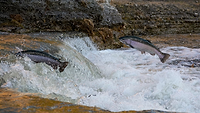Swiss Canton Bans PFAS-Contaminated Beef as EFSA Explores PFAS Immunotoxicity

Image credit: Daniel Seßler via Unsplash
A recent European Food Safety Authority (EFSA) project explored new methods to fill data gaps about the immunotoxicity of per- and polyfluoroalkyl substances (PFAS), while one Swiss canton has banned the sale of beef contaminated by the “forever chemicals” and called for a national action plan to address the issue of PFAS in foods.
Globally, PFAS have become a topic of increasing concern due to the mounting body of evidence about their persistence in the environment—and thereby, food and water—as well as their harms to human health. For example, recent data has shown that the average proportion of produce containing PFAS pesticide residues in the EU has nearly tripled over the last decade, and in Switzerland, a study found PFAS and other toxic chemicals in more than two-thirds of Dutch strawberries. Additionally, the influential German Federal Institute for Risk Assessment (BfR) has even published suggested limits for PFAS in animal feed that would prevent animal-derived foods from exceeding EU-regulated PFAS maximum levels.
EFSA Delivers New Strategy for Understanding PFAS Immunotoxicity Mechanisms
Epidemiological research has demonstrated that PFAS can cause immunosuppression, increased risk of infections, and decreased response to vaccination, but the reasons for these effects are still unclear. To fill data gaps, EFSA launched a project to understand the mode of action for immunotoxic effects of PFAS using new approach methodologies (NAMs), including in vitro (i.e., taking place outside a living organism, such as a test tube or culture dish) and in silico (i.e., computerized experimentation) methods. The project has culminated in the formation of a NAMs‐based strategy that enables the generation of mechanistic information regarding PFAS immunotoxicity, which can be used to support future risk assessment.
The entirety of the technical project’s findings and methodology can be read in EFSA’s report.
PFAS Problem in St. Gallen, Switzerland
At the same time, one Swiss canton (the 26 cantons comprise the Swiss Confederation)—specifically, the canton of St. Gallen, recently banned the sale of beef containing PFAS. According to an official statement from the canton, the use of PFAS-contaminated sewage sludge from wastewater treatment plants was used as fertilizer on farms in the canton until 2006. Since 2021, Swiss authorities have been aware of PFAS contamination of soil in Eggersriet, a St. Gallen municipality, and subsequent investigation revealed the issue to be even more widespread than previously known; testing has shown more contamination hotspots in the St. Gallen municipalities of Mörschwil, Untereggen, Goldach, Altenrhein, and St.Margrethen.
Sampling and testing of agricultural commodities conducted by the canton has shown elevated levels of PFAS in the meat and milk of cows from farms in contaminated areas, as well as in soil and spring water. However, the canton has affirmed that municipal drinking water supplies do not have levels of PFAS exceeding maximum levels. Based on the results the canton is doubling down on its efforts to ensure food exceeding PFAS maximum limits is not sold to the public.
The canton will begin on-site inspections and laboratory analyses for affected farms to verify compliance with PFAS maximum levels in the meat of their animals. Additionally, the canton has decreed that the affected farms may not move or excavate contaminate soils, and recommends that affected farms use municipal drinking water to produce food and hydrate their animals. If possible, the animals should feed on uncontaminated areas. Because the new requirements will affect the productivity of affected farms, the government will offer loans to the farmers and is investigating alternative production models.
The canton of St. Gallen is one of the first cantons in Switzerland to thoroughly investigate PFAS pollution, and therefore, there is little knowledge on how to reduce the burden of PFAS contamination in the country. Although there are some specifications for PFAS limits in certain foods, the Swiss federal government has not addressed PFAS values for milk and dairy products. The canton of St. Gallen is urging the Swiss Parliament to swiftly develop a federal action plan to remediate PFAS contamination and to define maximum values for the chemical in milk and dairy products as soon as possible.
The canton of St. Gallen intends to expand its sampling for PFAS contamination, and warns that additional affected areas and farms may be discovered. The canton also aims to formalize a PFAS sampling framework based on the experience gained from its activities.
Looking for a reprint of this article?
From high-res PDFs to custom plaques, order your copy today!






